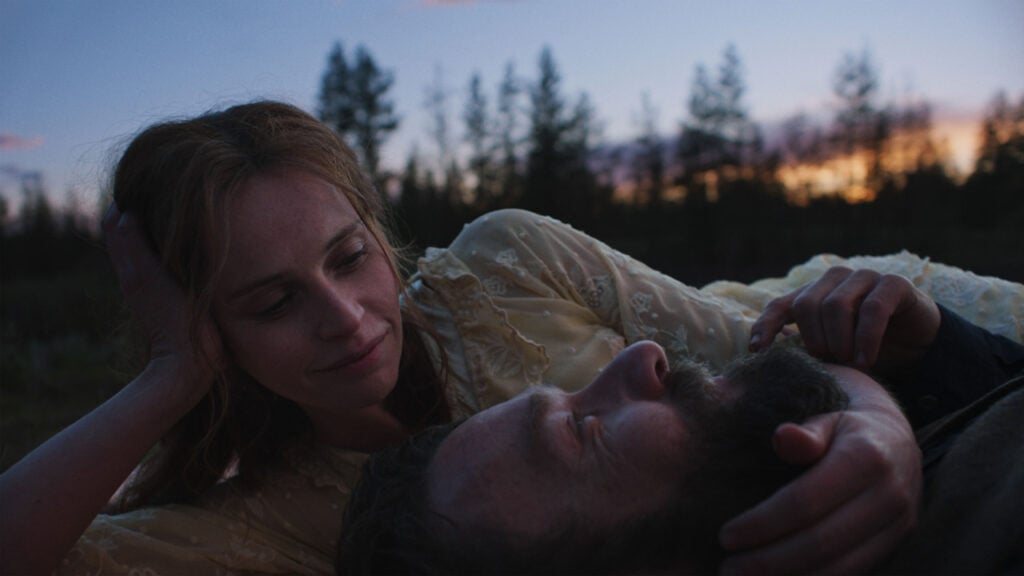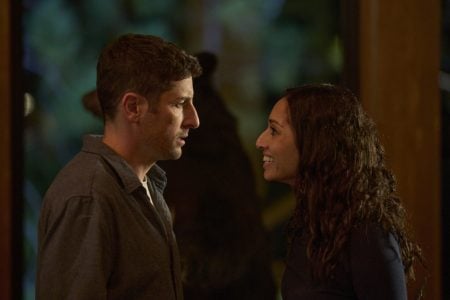People are always remarking on the passage of time; you hear it in everyday conversations. A neighbor mentions how they can’t believe it’s already August again, and someone else wonders aloud where their day went. Humankind has been trying to understand the quality and quantity of time probably since first gaining consciousness. There is usually one thing we all agree on about time, and that is that there’s never enough of it available to us, especially in those quiet moments filled with contentment and satisfaction.
The same creative team that brought us both Jockey and Sing Sing has returned with Train Dreams, an adaptation of the novella of the same name by author Denis Johnson. This time Clint Bentley is in the director’s chair while co-writing with partner Greg Kwedar. The film not only covers how one man grapples with time and grief but also what might be the filmmaking team’s pet theme: an exploration of masculinity through vulnerability and emotional intelligence.
Robert Grainer (Joel Edgerton), orphaned as a child, grows into a young man without having made any real human connection. That is until he meets Gladys (Felicity Jones) who he falls deeply in love with. They build a house in the Pacific Northwestern woods where they live a quiet life in the early twentieth century off of the land and soon have a child together. Robert is a day laborer and takes a job as a logger which causes him to frequently be ripped away from his wife and daughter, Kate (Zoe Rose Short), in order to go on extended jobs far away from home where he helps to expand the U.S. railways.
Robert spends the majority of his time while working longing to be home with his family while also quietly observing the other men on his team. He witnesses a horrific act of violence during one of these jobs that haunts him for the rest of his life, creeping into the tranquil contentment he has cultivated at home. Life passes both slowly and quickly for him while personal tragedies strike, and he must learn to navigate his way through grief in what can only appear to him as an unforgiving life.
Train Dreams feels like it could have been made by Terrence Malick. It is filled with breathtaking cinematography complete with the same style of naturalistic filmmaking and soft murmurings and laughter of the actors to one another during long, contemplative shots. The story unfolds linearly with a narrator (Will Patton) to guide us through any flashbacks or time jumps that occasionally occur. Everything is tied together by a gorgeous score composed by Bryce Dessner. This film is gentle filmmaking at its finest.
This is one of Joel Edgerton’s most tender and quiet performances yet, and Felicity Jones matches him perfectly in their scenes together. Her character of Gladys is never forced into the background when she is on screen. She and Robert are more like equal partners in their marriage, conferring with one another on financial and life issues. They even take the time to do necessary chores together like hunting so they can spend more time with one another. They genuinely enjoy each other’s company, and Robert’s enduring love and devotion for Gladys is returned to him in full by her. It is truly lovely to watch them together and may only be rivaled by the sweet and affectionate scenes between Robert and his daughter playing and laughing together.
Progress and technological advances pull American life and society forward at a quick pace in the twentieth century. Work starts to become something that must be found outside the home and in Robert’s case, farther away from it. He watches the men working alongside him, toiling away long hours in dangerous work conditions, trying to make sense of all of these changes just like he is. He listens with amusement and fondness to the old explosive “expert”, Arn Peeples (William H. Macy), wax poetic about life and things that Robert himself won’t fully grasp until he’s much older. Many of these men die preventable deaths all in the name of American industry and capitalism. All of it creates a sickness that infects everyone’s lives.
Capitalism, progress, and time come bearing down on Robert just like the train that he builds tracks for. It traps him within the gender roles of a patriarchal capitalist society and crashes through the quiet woods where he has built a life and home together with his wife that has become his safe haven. The moments of the film that seem most at peace and clear are when we are watching Robert at home with his family or looking out into the stillness of the earth that is still untouched by this new and ever-changing society.
Grief looms heavily throughout the film, not only due to plentiful tragic circumstances, but also lost time and a way of life that is no longer possible. We are watching Robert being robbed of one of the resources we as humans consider most valuable every time he leaves for a job and also later in the film, when he is stuck in sorrow. It is all too relatable. The film also allows us to grieve alongside Robert. We hold out hope with him even when we rationally know there isn’t a reason to. It reminds us that grief has its own timeline, and every person travels it at their own pace. Robert is able to start the process of moving on and healing when he is finally able to unburden himself to a friend who has experienced a similar tragedy. Only then does he begin to open himself up to living again, and he starts to appreciate and understand what Arn Peeples told him about life so many years prior.
Clint Bentley and Greg Kwedar have created a delicate and deeply moving existential film that is somehow life-affirming in its heartbreak. Train Dreams offers its audience hope in its bittersweetness. It subtly points out the pitfalls of capitalism while emphasizing to us how life is fleeting, painful, and beautiful all at once. Life is a string of moments both good and bad, and we must not get stuck in any singular one.
Train Dreams had its World Premiere in the Premieres section of the 2025 Sundance Film Festival. The film will be released by Netflix on a date yet to be determined.
Director: Clint Bentley
Writer: Clint Bentley and Greg Kwedar
Rated: NR
Runtime: 102m
Clint Bentley and Greg Kwedar return to Sundance with a contemplative drama that captures the gentle beauty of life. Joel Edgerton delivers one of the best performances of his career as a character filled with vulnerability and emotional intelligence. It is a stunning experience not to be missed.
-
GVN Rating 9
-
User Ratings (0 Votes)
0

When I’m not busy daydreaming or having an existential crisis, I can usually be found watching a movie or TV, listening to music or a podcast, or with my nose in a book.






